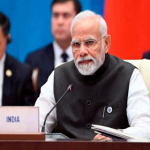The recent SCO Summit was significant not only because it was held after three years due to the pandemic but also due to the intricate dynamics of States, its rapid expansion and the learnings India can take away in light of it taking over the presidency in 2023.
The 22nd summit of the heads of State of the Shanghai Cooperation Organisation (SCO) held in Samarkand, Uzbekistan, marks an important milestone in its evolution. After a gap of about three years imposed by the pandemic, leaders of Russia, China, the Kyrgyz Republic, Kazakhstan, Tajikistan, Uzbekistan, India, and Pakistan met in person and were joined by a few others — the observers, dialogue partners, and special guests. This impressive SCO assembly nurtures the ambition to work for a secure and prosperous Eurasia. It also has the vision of a “Greater Eurasian Partnership” encompassing the SCO region, the Eurasian Economic Union (EEU), and the Association of Southeast Asian Nations (ASEAN).
Is this goal achievable? The SCO has complex inner dynamics: China and India have serious concerns and questions about the Ukraine conflict; the four Central Asian Republics (CARs) are committed to preserving their autonomy while dealing with their two large neighbours (China and Russia); and China, India, and Pakistan are caught in a web of rising tensions to the extent that no bilateral meetings between the leaders of China and India, and of India and Pakistan took place on the sidelines. Prime Minister Narendra Modi’s call for “greater cooperation and mutual trust” thus becomes pertinent.
The SCO’s importance is evident: It represents 40% of the world’s population, 30% of the global Gross Domestic Product (GDP), and 22% of the planet’s land. Its footprint is expanding speedily. Iran is joining as the ninth member, and Belarus is on its way to becoming the 10th. Eight countries have been accepted as new dialogue partners: Bahrain, Maldives, Kuwait, United Arab Emirates, Myanmar, Egypt, Saudi Arabia, and Qatar. This expansion towards West Asia and South Asia is designed to make SCO a pre-eminent pan-Eurasian grouping. and “an authoritative and influential multilateral association” devoted to peace and development.
A dispassionate scrutiny of the summit’s Samarkand Declaration comprising 121 paras, helps in understanding the mindset of the SCO leaders. They recognise that international challenges and threats have become more complex as the world situation is “dangerously degrading, existing local conflicts are intensifying, and new ones are emerging.” Their prescription to deal with the contemporary reality is to work actively for peace, security, and stability, and for strengthening trade, economic, cultural, and humanitarian relations among the member-States. Since its inception in 2001, the grouping has been preoccupied with countering the three threats of terrorism, separatism, and extremism, but, of late, greater attention is being devoted to economic development. This trend is clearly reflected in the summit outcome, which includes 28 decisions covering diverse areas.
To SCO, Central Asia represents the core, and its sustainable development is a top priority. At the same time and in consonance with the grouping’s geographic expansion, enhancing connectivity between Central Asia and South Asia has assumed new importance. This is viewed as the vehicle for achieving prosperity and security “by building sustainable trade, economic, transport and communication links and strengthening the dialogue among civilizations”, as the Samarkand Declaration put it.
On Afghanistan, against the speculation of a possible breakthrough favourable to the Taliban regime, the SCO took a calibrated decision in calling for “the speedy settlement of the situation.” This puzzling phrase involves the establishment of Afghanistan as “an independent, neutral, united, democratic and peaceful state, free of terrorism, war and drugs.” The SCO believes it is “critical” to have an inclusive government with representatives from “all ethnic, religious and political groups of Afghan society.” It seems the status quo is set to continue for the present.
For India, the Samarkand summit was of special significance. Its host — Uzbekistan — is among the friendliest CARs. With the summit’s conclusion, the SCO presidency is now vested in India, which has the responsibility to guide and lead it and host the next summit in 2023.
There are numerous elements in the summit’s outcome that are relevant to India, especially its corporate sector, which will observe the SCO’s progress on connectivity projects, e-commerce initiatives, and plans for cooperation in the digital economy. India may push forward the implementation of the action plan to expand cooperation “in the field of digitalization and information and communication technologies.” The plan to create “an efficient and competitive transport and technological infrastructure” will certainly interest India, even though, unlike the other SCO members, it has stayed out of China’s Belt and Road Initiative (BRI). India’s priorities will be to develop resilient and diversified supply chains and share its experience in robust fintech, leading to innovation through start-ups and unicorns.
Samarkand, the historic melting pot of ideas and cultures, has generated “the Samarkand spirit”, with a focus on ensuring peace and sustainable development of Eurasia. It is a new geopolitical space that can complement the Indo-Pacific. With India as the new chair of SCO, New Delhi’s obvious task is to make the grouping more effective. A prerequisite for this vital mission is for the chair to initiate behind-the-scenes dialogue with all members at a high political level, including China and Pakistan.
Ambassador Rajiv Bhatia is Distinguished Fellow, Foreign Policy Studies, Gateway House
This article was earlier published in the Hindustan Times


